Standards of conduct crossword clue – Embark on an enlightening journey into the realm of standards of conduct, where ethical principles, professional norms, and legal frameworks intertwine to shape our actions. From personal values to organizational cultures, this comprehensive guide unravels the complexities of ethical behavior, providing a roadmap for navigating the nuances of standards of conduct.
As we delve into this multifaceted topic, we will explore the historical evolution of ethical norms, examine the influence of cultural and social contexts, and highlight the mechanisms for enforcing accountability. Join us as we decipher the standards of conduct crossword clue, unraveling the intricate tapestry of ethical decision-making.
Ethical Principles
Ethical principles serve as the foundation for ethical conduct, guiding individuals and organizations in their decision-making and actions. These principles provide a framework for distinguishing right from wrong, ensuring that behavior aligns with moral values and societal expectations.
Adhering to ethical standards is paramount in both personal and professional life. By doing so, individuals and organizations demonstrate integrity, build trust, and contribute positively to society. Ethical conduct fosters a culture of fairness, transparency, and accountability, which are essential for maintaining a harmonious and just society.
Fundamental Ethical Principles
The following principles form the cornerstone of ethical conduct:
- Integrity:Acting with honesty, trustworthiness, and consistency in all dealings.
- Respect:Treating others with dignity, empathy, and fairness, regardless of their differences.
- Responsibility:Taking ownership of one’s actions, decisions, and their consequences.
- Accountability:Being transparent about actions and decisions, and accepting responsibility for their outcomes.
- Justice:Treating people fairly and equitably, upholding the rule of law and human rights.
- Autonomy:Respecting the rights and freedoms of others, including their right to make their own choices.
- Beneficence:Acting in a manner that promotes the well-being of others.
- Non-maleficence:Avoiding actions that could harm others.
Professional Standards
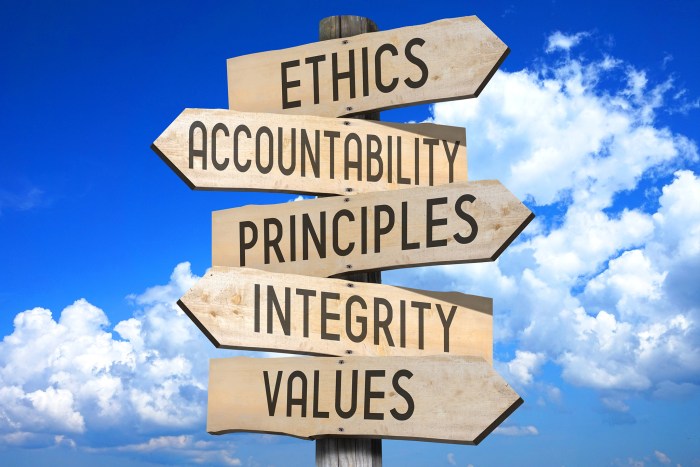
Professional standards are established guidelines and ethical principles that govern the conduct of individuals within specific industries or professions. They serve as a framework for maintaining quality, integrity, and ethical behavior, ensuring that professionals adhere to the highest standards of practice.
These standards are developed by professional organizations, regulatory bodies, or industry associations and are often enforced through codes of ethics, licensing requirements, and continuing education programs. By adhering to professional standards, individuals demonstrate their commitment to ethical conduct, competence, and the well-being of the public they serve.
Examples of Professional Standards, Standards of conduct crossword clue
Examples of professional standards vary across different fields, but some common examples include:
- Medical professionals:Adhere to ethical principles of patient confidentiality, informed consent, and non-maleficence (do no harm).
- Legal professionals:Uphold the principles of confidentiality, loyalty to clients, and the fair administration of justice.
- Financial professionals:Follow ethical guidelines regarding conflicts of interest, fiduciary responsibilities, and accurate financial reporting.
- Engineering professionals:Maintain standards of safety, sustainability, and environmental protection in their designs and projects.
- Educational professionals:Promote academic integrity, fairness in assessment, and the well-being of students.
Consequences of Violating Professional Standards
Violating professional standards can have serious consequences, including:
- Loss of license or certification:Regulatory bodies may revoke the licenses or certifications of professionals who violate ethical standards or fail to meet continuing education requirements.
- Legal liability:Professionals may face civil or criminal penalties if their conduct results in harm to clients, patients, or the public.
- Damage to reputation:Violations of professional standards can damage an individual’s reputation and make it difficult to obtain future employment or advancement.
Mechanisms for Enforcing Professional Standards
Professional standards are enforced through a variety of mechanisms, including:
- Codes of ethics:Professional organizations establish codes of ethics that Artikel expected standards of conduct and provide guidance for ethical decision-making.
- Licensing and certification:Regulatory bodies issue licenses or certifications to professionals who meet specific qualifications and adhere to ethical standards.
- Continuing education:Professionals are required to complete continuing education programs to stay up-to-date on best practices and ethical considerations.
- Disciplinary boards:Professional organizations or regulatory bodies may establish disciplinary boards to investigate and adjudicate complaints of ethical violations.
Legal Compliance
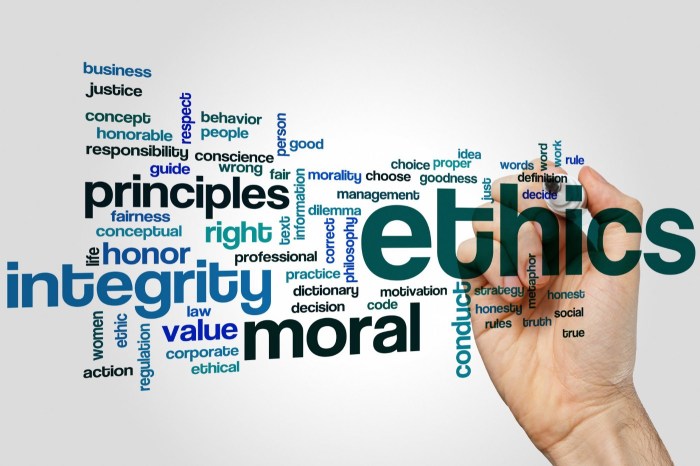
Legal compliance forms the foundation of standards of conduct in society, establishing a framework of laws and regulations that govern ethical behavior and impose penalties for violations.
The legal framework encompasses a wide range of laws and regulations, including:
- Constitutions and statutes
- Administrative regulations
- Codes of conduct
- Industry-specific regulations
These laws and regulations define ethical behavior, prohibit misconduct, and provide mechanisms for enforcement and penalties.
Role of Legal Compliance
Legal compliance plays a crucial role in promoting ethical conduct and preventing misconduct by:
- Providing clear guidelines for acceptable and unacceptable behavior
- Establishing consequences for violations, deterring misconduct
- Creating a level playing field for businesses and individuals
- Protecting the public from unethical and harmful practices
Organizational Culture
Organizational culture plays a pivotal role in shaping and influencing standards of conduct within an organization. It encompasses the shared values, beliefs, norms, and behaviors that characterize the organization and guide the actions of its employees.
Organizations with strong ethical cultures place a high value on integrity, honesty, and ethical decision-making. These organizations typically establish clear codes of conduct and ethics policies that Artikel expected behaviors and provide guidance for employees.
Role of Leadership
Leadership plays a crucial role in shaping and maintaining an ethical organizational culture. Ethical leaders set the tone and provide a model for ethical behavior by demonstrating integrity, transparency, and accountability.
- Setting clear expectations:Ethical leaders establish clear expectations for ethical behavior and communicate these expectations to employees through words and actions.
- Creating a supportive environment:Ethical leaders create a work environment that supports ethical behavior by providing resources, training, and opportunities for employees to discuss ethical issues and seek guidance.
- Encouraging open communication:Ethical leaders encourage open communication and feedback, creating a culture where employees feel comfortable raising ethical concerns and reporting misconduct.
- Holding employees accountable:Ethical leaders hold employees accountable for ethical behavior and take appropriate disciplinary action when ethical violations occur.
Personal Values
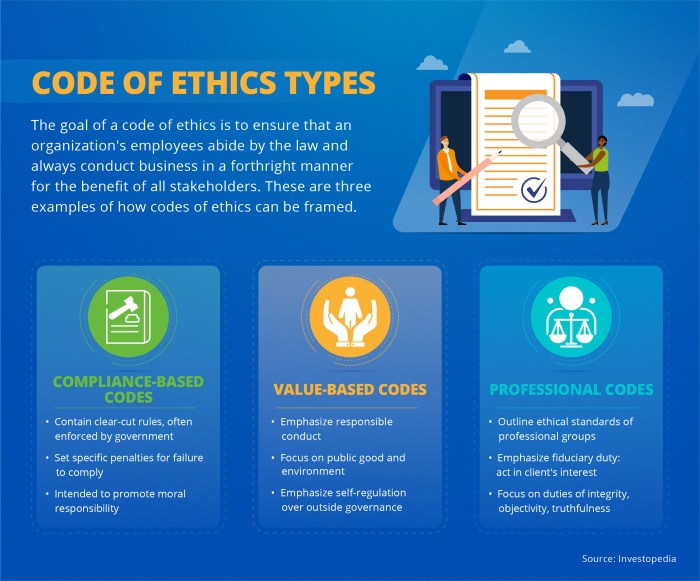
Personal values are deeply held beliefs that guide individuals’ thoughts, feelings, and behaviors. They shape standards of conduct by providing a framework for ethical decision-making and influencing how individuals prioritize competing interests.
Influence of Cultural, Social, and Religious Factors
Personal values are influenced by various factors, including culture, society, and religion. Culture shapes values through shared beliefs, norms, and traditions. Society reinforces values through laws, regulations, and social expectations. Religion often provides moral guidance and influences individuals’ values through teachings and commandments.
Examples of Personal Values Guiding Ethical Decision-Making
- Honesty:Values honesty and truthfulness, leading individuals to make decisions that maintain integrity and avoid deception.
- Integrity:Upholds moral principles and values even when faced with pressure or temptation.
- Fairness:Values impartiality and justice, ensuring decisions are made without bias or favoritism.
li> Responsibility:Takes ownership of actions and decisions, holding oneself accountable for their consequences.
Enforcement and Accountability
Ensuring adherence to standards of conduct requires robust enforcement mechanisms and accountability measures. These mechanisms serve to deter misconduct, promote ethical behavior, and maintain the integrity of organizations and professions.
Accountability plays a crucial role in fostering ethical conduct and preventing misconduct. Holding individuals and organizations accountable for their actions creates a culture of responsibility and transparency, where unethical behavior is less likely to occur.
Enforcement Mechanisms
Various enforcement mechanisms exist to address violations of standards of conduct. These include:
- Ethics Committees:Internal bodies within organizations responsible for investigating and adjudicating ethical concerns, providing guidance, and recommending disciplinary actions.
- Disciplinary Actions:Formal measures taken by organizations to address misconduct, ranging from reprimands to termination of employment.
- Legal Sanctions:Government-imposed penalties for violations of laws and regulations that govern ethical conduct, such as fines, imprisonment, or license revocation.
Cultural and Social Context
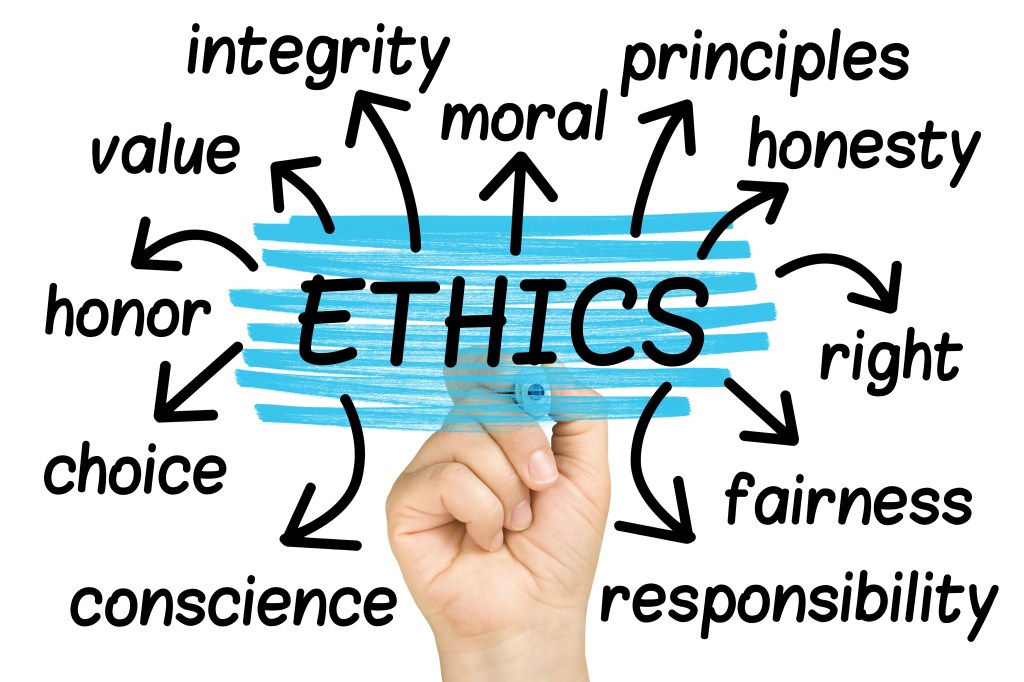
Cultural and social norms profoundly influence standards of conduct. They shape ethical values, perceptions of right and wrong, and acceptable behaviors within specific societies.
Ethical values vary across cultures. For instance, in some cultures, collectivism is highly valued, emphasizing the importance of group harmony and cooperation. In contrast, other cultures prioritize individualism, valuing personal autonomy and achievement.
Challenges of Navigating Ethical Dilemmas
Navigating ethical dilemmas in different cultural and social contexts can be challenging. Individuals may face conflicts between their personal values and the prevailing cultural norms. They may also encounter situations where ethical standards differ across cultures.
- Cultural Relativism: The belief that ethical values are relative to the specific culture in which they are practiced.
- Universalism: The belief that there are certain ethical principles that apply to all cultures and individuals.
Resolving ethical dilemmas in cross-cultural contexts requires sensitivity, cultural awareness, and an understanding of the ethical frameworks that shape different societies.
Historical Perspectives: Standards Of Conduct Crossword Clue
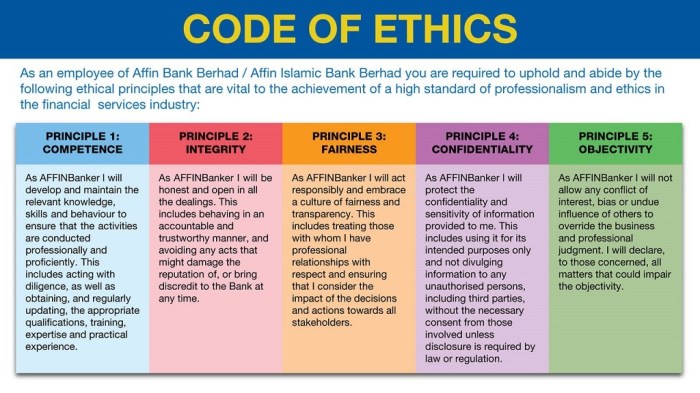
Standards of conduct have evolved throughout history, shaped by societal norms, cultural values, and legal frameworks. The development of ethical principles has been influenced by historical events, social movements, and technological advancements.
In ancient civilizations, ethical norms were often based on religious beliefs and traditions. The Code of Hammurabi, created in ancient Mesopotamia around 1750 BCE, established a system of laws that included ethical principles such as fairness and justice.
Influence of Greek Philosophy
Greek philosophers, such as Socrates, Plato, and Aristotle, played a significant role in the development of ethical thought. They emphasized the importance of reason, virtue, and the pursuit of knowledge. Their ideas influenced the development of ethical principles in Western societies.
Christian and Islamic Ethics
The rise of Christianity and Islam introduced new ethical perspectives. Christian ethics emphasized love, compassion, and forgiveness, while Islamic ethics stressed justice, equality, and social responsibility.
Enlightenment and the Social Contract
During the Enlightenment period, philosophers such as John Locke and Jean-Jacques Rousseau developed the concept of the social contract. This idea suggested that individuals give up some of their freedoms in exchange for protection and security from the government. The social contract theory influenced the development of ethical principles related to individual rights and responsibilities.
Industrial Revolution and Social Movements
The Industrial Revolution and the rise of labor movements led to new ethical challenges. Workers faced exploitation and unsafe working conditions. Social movements, such as the labor movement and the civil rights movement, fought for ethical treatment and equality.
Technological Advancements
Technological advancements have also influenced ethical standards. The development of new technologies, such as artificial intelligence and genetic engineering, raises ethical questions about privacy, autonomy, and the responsible use of power.
International Standards
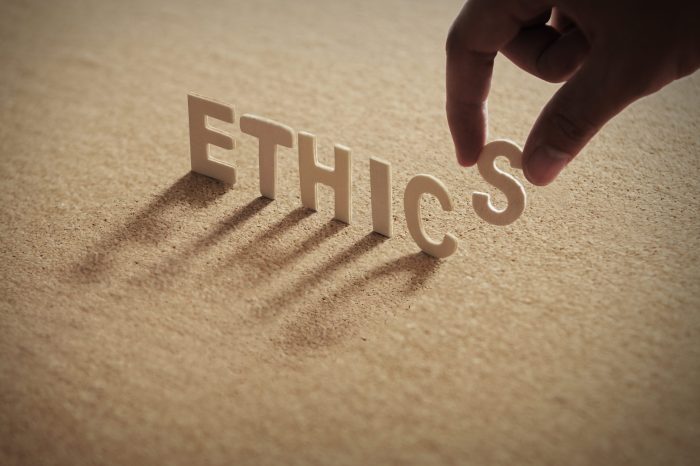
International organizations and agreements play a pivotal role in establishing global standards of conduct that promote ethical behavior and combat misconduct. These entities provide a framework for nations to cooperate and address transnational issues that impact business practices and societal norms.
Numerous international conventions and treaties have been developed to address specific aspects of ethical conduct. For instance, the United Nations Convention against Corruption (UNCAC) is a comprehensive agreement that criminalizes bribery, money laundering, and other forms of corruption in both the public and private sectors.
The International Labour Organization (ILO) has adopted several conventions that promote decent work, including the Declaration on Fundamental Principles and Rights at Work, which Artikels core labor standards such as freedom of association, collective bargaining, and the elimination of child labor.
Challenges and Cooperation
Enforcing international standards of conduct presents challenges due to differences in national laws and regulations, cultural norms, and levels of economic development. To overcome these obstacles, nations need to cooperate and work together to develop harmonized standards, provide technical assistance, and share best practices.
International organizations play a crucial role in facilitating cooperation among nations. The Organization for Economic Co-operation and Development (OECD) has developed guidelines on corporate governance, anti-bribery, and tax transparency. The World Bank and the International Monetary Fund (IMF) provide technical assistance to countries in implementing international standards and promoting economic integrity.
FAQ Guide
What is the significance of adhering to ethical standards?
Adhering to ethical standards fosters trust, integrity, and fairness in personal and professional relationships, promoting a harmonious and just society.
How do professional standards contribute to industry excellence?
Professional standards ensure quality, consistency, and ethical practices within specific industries, safeguarding public trust and maintaining high levels of performance.
What is the role of organizational culture in shaping ethical conduct?
Organizational culture sets the tone for ethical behavior, influencing employees’ values, decision-making, and actions, promoting a culture of integrity and ethical conduct.
How can personal values guide ethical decision-making?
Personal values serve as a moral compass, shaping our perceptions of right and wrong, guiding ethical decision-making, and influencing our actions in various situations.
What mechanisms are in place to enforce accountability for ethical violations?
Enforcement mechanisms such as ethics committees, disciplinary actions, and legal sanctions hold individuals and organizations accountable for ethical violations, promoting compliance and deterring misconduct.